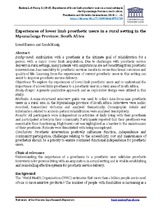| dc.contributor.author | Ennion, Liezel | |
| dc.contributor.author | Manig, Sarah | |
| dc.date.accessioned | 2018-08-21T12:49:49Z | |
| dc.date.available | 2018-08-21T12:49:49Z | |
| dc.date.issued | 2018 | |
| dc.identifier.citation | Ennion, L. & Manig, S. (2018). Experiences of lower limb prosthetic users in a rural setting in the Mpumalanga Province, South Africa. Prosthetics and Orthotics International, 2018: 1 – 10. | en_US |
| dc.identifier.issn | 0309-3646 | |
| dc.identifier.uri | https://doi.org/10.1177/0309364618792730 | |
| dc.identifier.uri | http://hdl.handle.net/10566/3958 | |
| dc.description.abstract | BACKGROUND: Ambulation with a prosthesis is the ultimate goal of rehabilitation for a person with a major lower limb amputation. Due to challenges with prosthetic service delivery in rural settings, many patients with amputations are not benefitting from prosthetic interventions. Inaccessibility to prosthetic services results in worse functional outcomes and quality of life. Learning from the experiences of current prosthetic users in this setting can assist to improve prosthetic service delivery.
OBJECTIVES: To explore the experiences of lower limb prosthetic users and to understand the importance of a lower limb prosthesis to a prosthetic user in a rural area of South Africa.
STUDY DESIGN: A generic qualitative approach and an explorative design were utilised in this study.
METHODS: A semi-structured interview guide was used to collect data from nine prosthetic users in a rural area in the Mpumalanga province of South Africa. Interviews were audio-recorded, transcribed verbatim and analysed thematically. Demographic details and information related to acute in-patient rehabilitation were analysed descriptively.
RESULTS: All participants were independent in activities of daily living with their prosthesis and participated actively in their community. Participants reported that their prosthesis was essential to their functioning. High travel cost was highlighted as a barrier to the maintenance of their prosthesis. Patients were dissatisfied with being unemployed.
CONCLUSION: Prosthetic intervention positively influences function, independence and community participation. Challenges relating to the accessibility, cost and maintenance of prosthetics should be a priority to ensure continued functional independence for prosthetic users. | en_US |
| dc.language.iso | en | en_US |
| dc.publisher | SAGE Publications | en_US |
| dc.rights | This is the author-version of the article published online at: https://doi.org/10.1177/0309364618792730 | |
| dc.subject | Prosthetics and orthotics services in low-income countries | en_US |
| dc.subject | Developing countries | en_US |
| dc.subject | Rehabilitation of prostheses users | en_US |
| dc.subject | Rehabilitation | en_US |
| dc.subject | Rural | en_US |
| dc.subject | Prosthetic user experiences | en_US |
| dc.title | Experiences of lower limb prosthetic users in a rural setting in the Mpumalanga Province, South Africa | en_US |
| dc.type | Article | en_US |
| dc.privacy.showsubmitter | FALSE | |
| dc.status.ispeerreviewed | TRUE | |

